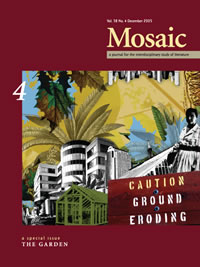Issue 38.4
Overview

Special Issue: The Garden
Published: December 2005
View the issue introduction or see the issue summary and contents below.
12 essays, totalling 240 pages
$22.95 CAD
Beginning with a full color signature of artist Don Reichert's landscape paintings and digital photographs, this special issue includes twelve essays that read "the garden" in diverse and provocative ways. Here you will find, among other things, the Victorian garden; de Beauvoir's ideas on the relation of the subject to space and travel; the garden politics of Roethke and Heaney; hybridity, postcolonial hybridity included; gardening in the age of electronic reproduction; the garden in its multiple contexts in Canada, the USA and Latin America; a case of invading flying foxes in the Melbourne Botanical Gardens; and the botanical garden as trope. These are essays that take you through the flora and fauna of various world literatures and that open up multiple critical possibilities.
Bats in the GardensHelen Tiffin The nature/culture dichotomy finds uneasy resting ground in the garden. But particularly in settler cultures, “the garden” introduces other unresolved dichotomies: indigenous and imported; wild and domesticated; pests and pets; traditional myth and scientific rationality. This essay considers these issues by focussing on the public debate over fruit bat colonies in the Melbourne (Australia) Botanical Gardens. | |
“Bare Life” and the Garden Politics of Roethke and HeaneyMICHAEL O'SULLIVAN This essay reads the poetry of Theodor Roethke and Seamus Heaney in the light of Giorgio Agamben’s philosophy of plant and animal life and his notion of “bare life.” It argues that both poets offer very different descriptions of the nature of the relationship between human and non-human life. | |
“Il faut cultiver son jardin”: Beauvoir and the Limits of SpaceAMANDA CRAWLEY JACKSON This essay explores Beauvoir’s changing thoughts concerning the relation of the subject to space and travel through the medium of her autobiographical writings and the 1947 essay, Pyrrhus et Cinéas. Using contemporary feminist geographical thought, it suggests that the garden can be considered as an important metaphor for her ontology. | |
The Garden and its Multiple Contexts in Canada, the United States and Latin AmericaPATRICK IMBERT By evoking the democratization of the right to property in the Americas, this essay analyzes the relationship to territory, which ceases to be based only on the Adamic myth of the garden, or on roots and nationalism. The essay concludes that liberalism gives access to different habitats of meaning linked to cultural encounters. | |
“Hothouse Flowers and Despair”: Reading the Victorian Garden in M. E. Braddon’s The Doctor’s WifeNarin Hassan Through analysis of M.E. Braddon’s novel, The Doctor’s Wife, this essay discusses shifting representations of the garden in Victorian culture and suggests that gardens mediate constructions of gender, modernity, and female authorship. Braddon’s botanical imagery situates the garden as a marker of mid-nineteenth century social and cultural change. | |
Gardening in the Age of Electronic (Re)production: Walter Benjamin and the Work of TeachingBARBARA LANGHORST The following essay is designed to animate Benjamin’s urgent call to stewardship. The collage asks you to read the world as a negotiation of fertility and decay, intent and importunity. What matters, what disposes matter, is literally that which stands between what we perceive as form and content—namely, relation. | |
Gardening in the Diaspora: Place and Identity in Olive Senior’s PoetryJORDAN STOUCK Senior’s poetry collection, Gardening in the Tropics, asserts the need for identity distinctions and dynamic exchanges, deploying the garden, in its ambivalent history as a space of colonial exclusion and postcolonial hybridity, as a figure for these processes. Senior both embraces and problematizes the rhizomatic and creolizing theories of Gilles Deleuze, Felix Guattari and Edouard Glissant. | |
Hothouse Weeds: Poetic Responses to the Botanical Garden in Modern JapanDENNITZA GABRAKOVA In the process of Japan’s westernization and modernization, an herb garden within Tokyo limits is transformed into a “botanical garden”—a literal site where the western, the imperial, the urban, and the poetic intersect. The botanical garden transcends its material confines in order to offer a literary trope for the forging of Japanese modern-style poetry and its kernel—interiority. | |
Cape Gooseberries and Giant Cauliflowers: Transplantation, Hybridity, and Growth in Bessie Head’s A Question of PowerANISSA TALAHITE As a counterpoint to social reality, the garden opens a range of possibilities for reinterpreting and reworking some of the myths on which patriarchal and colonial discourses have traditionally relied. This essay examines ways in which Head’s image of the communal agricultural garden achieves this aim. | |
Au nom du discours amoureux : Une étude glissantienne de Gouverneurs de la Rosée et Romeo and JulietJASON HERBECK Tirant des leçons écologiques des images botaniques postulées par Édouard Glissant dans Introduction á une poétique du Divers, cette étude se propose d’explorer, en termes de racine unique et de rhizome, les discours amoureux et haineux de deux textes diversifiés en genre comme en pays et culture d’origine. | |
Booker T. Washington, August Wilson and the Shadows in the GardenLADRICA MENSON-FURR This essay situates dramatist August Wilson’s twentieth century cycle dramas within the socioeconomic theory espoused by Booker T. Washington in his “Atlanta Exposition Address.” The essay suggests that, similar to Washington, Wilson recognizes the value of farming and land ownership as viable components in the African American male’s history. | |
True Matters Concealed: Utopia, Desire, and Enlightenment in Honglou mengMARK S. FERRARA The inevitable collapse of the utopian world of Daguanyuan 大观园 in The Dream of the Red Chamber (红楼梦) paradoxically facilitates Bao-yu’s enlightenment, and therefore helps him move from a spatial utopia to a mental one informed by Chinese Buddhist epistemology. |